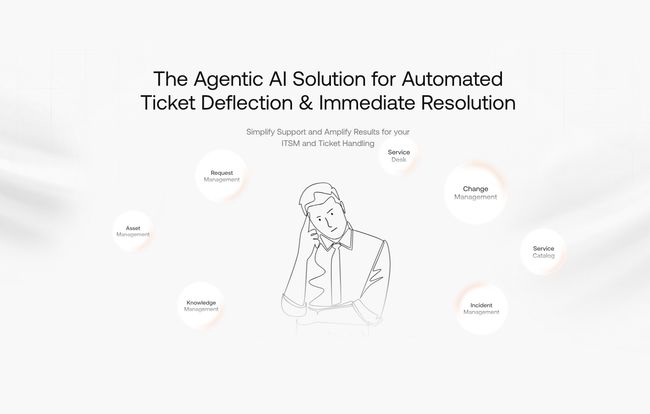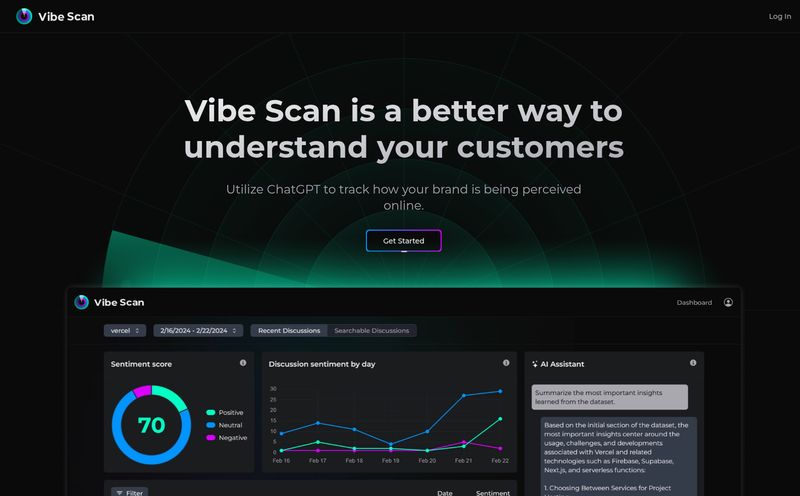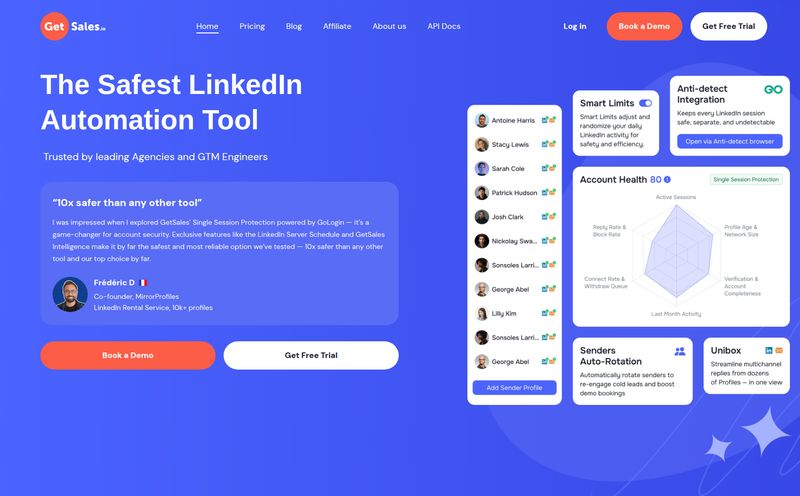If you're managing any kind of internal support—be it IT, HR, or facilities—you've had those days. The days where the ticket queue looks like a traffic jam on the M25 and you're handing out password resets like you're dealing cards. It's a frustrating, endless game of whack-a-mole. You close one ticket, three more pop up. We've all been there.
For years, the solution has been to either hire more people or invest in clunky, complicated ITSM (IT Service Management) platforms that feel like they were designed in 1998. But lately, there's been a new buzzword floating around: AIOps. And that's where companies like Serviceaide come into the picture, promising to be less of a band-aid and more of a cure.
I've been watching the AIOps space for a while now, and I’m naturally skeptical. A lot of tools promise the world and deliver a pamphlet. So, when I got a chance to look into Serviceaide, I wanted to see if it was just more AI hype or something genuinely useful. Let's get into it.

Visit Serviceaide
So, What Exactly is Serviceaide, Anyway?
At its core, Serviceaide is an enterprise service management platform that leans heavily on artificial intelligence. Think of it as your traditional service desk, but with a brainy AI assistant bolted on. The main goal is to automate the repetitive stuff and empower users to solve their own problems, freeing up your human team for the tricky, high-value work.
Their big pitch is what they call an "Agentic AI Solution." It’s a fancy term, but the idea is simple: create an AI that can act like a real agent to deflect tickets before they're even created. It’s not just for the IT crowd, either. The platform is designed to work across different departments, so your HR team can use it to answer payroll questions and your facilities team can handle room booking requests, all from one place. I’ve seen a lot of companies struggle with siloed support systems, so a unified approach is always a plus in my book.
The AI-Powered Engine: Luma and First Contact Resolution
The real secret sauce here is their AI, which they call Luma. This isn't just a simple chatbot that pulls from a static FAQ page. Luma is designed to understand context and guide users to a solution, effectively becoming the first point of contact.
Automated Ticket Deflection: A Dream Come True?
This is the feature that gets me most excited. The platform's big promise is ticket deflection and first contact resolution. Instead of a user firing off an email to support for a simple issue, they interact with the AI. Luma can walk them through troubleshooting steps, point them to the right article in the knowledge base, or even automate a process like a password reset. The goal is to solve the problem right then and there.
From my experience in traffic generation, this is like optimizing a landing page for conversions. You want to remove every possible point of friction. In this case, the friction is waiting for a human agent. If the AI can handle 60-70% of the common, low-level requests, your team's productivity doesn't just improve, it transforms.
Smarter Knowledge Management
We all have that internal wiki or knowledge base that's a complete mess. It's outdated, hard to search, and nobody uses it. Serviceaide aims to fix this by integrating knowledge management directly into the AI's workflow. The AI helps keep information relevant and makes it incredibly easy for users to find what they need. A well-tended digital garden, rather than a forgotten digital graveyard. It’s a small thing, but it makes a huge difference in user adoption.
The Real-World Benefits of an AI on Your Team
Okay, so the tech sounds cool. But what does it actually do for a business? Here’s my breakdown of the tangible upsides based on what Serviceaide offers.
First off, the efficiency gains are obvious. Automating manual processes means your team can finally get to that backlog of projects they've been putting off. It's about working smarter, not harder—a cliché, I know, but it fits perfectly here. Secondly, you get improved self-service. Employees these days expect a consumer-grade experience. They want to find answers themselves, just like they would on Google. Giving them a tool that actually works makes them happier and more productive. Lastly, the platform is built to be scalable. As your company grows, the volume of support requests grows with it. A system like this is designed to handle that increase without you needing to constantly hire more support staff. It's a powerfull way to future-proof your operations.
Let's Be Real: The Not-So-Shiny Parts
No tool is perfect, and I’d be doing you a disservice if I painted Serviceaide as a magical fix for all your problems. There are a few things to consider.
For one, there's an initial setup. Any tool this comprehensive requires some configuration to get it just right for your organization. You can't just flip a switch. My experience tells me that projects like this need a dedicated internal champion to see them through. Also, while the AI is smart, it's not omniscient. It needs to be trained on your specific processes and may require ongoing monitoring and adjustments. It’s a bit like a new employee; it needs guidance to perform at its best. Finally, there's likely a bit of a learning curve. While it's aimed at end-users, your admin team will need to get comfortable with the backend to truly maximize its potential.
What's the Damage? A Look at Serviceaide's Pricing
And now for the million-dollar question: what does it cost? Well, you won't find a neat little pricing table on their website. Serviceaide uses a "Flexible Pricing" model, which is corporate speak for "Request a Quote."
Don't let this scare you off. It's standard practice for enterprise-level software. Pricing is likely based on factors like the number of users, the specific modules you need, and the level of support you require. It means this probably isn't the right fit for a 10-person startup looking for a cheap helpdesk solution. This is a tool for established, growing businesses that see service management as a strategic investment, not just a cost center. To get the details, you'll have to reach out to their sales team directly.
So, Who Is Serviceaide Actually For?
After looking it all over, I have a pretty clear picture of the ideal Serviceaide customer. This is for a mid-to-large-sized organization that is feeling the pain of an overloaded service desk. You're probably seeing your support team get bogged down by repetitive tasks and you want to introduce automation that goes beyond simple ticketing. If you’re looking to improve the employee experience and see the value in investing in an AI-driven, long-term solution, then you should definitely request a demo.
Frequently Asked Questions About Serviceaide
1. What is Serviceaide Luma AI?
Luma AI is Serviceaide's conversational AI that acts as a virtual agent. It's designed to understand user requests, provide answers from the knowledge base, automate tasks, and guide users to resolve their own issues, thereby deflecting tickets from the human support team.
2. Is Serviceaide just for IT departments?
Not at all. While it has strong roots in ITSM, the platform is built for Enterprise Service Management (ESM). This means it can be configured to handle service requests for HR, Facilities, Finance, and other departments, creating a single, unified service portal for the entire organization.
3. How difficult is it to implement Serviceaide?
Like any enterprise tool, it requires a proper implementation project. It's not a simple plug-and-play app. You'll need to work with their team to configure workflows, integrate with your existing systems and train the AI. It’s an investment of time upfront for a long-term payoff.
4. Can Serviceaide integrate with other tools we use?
Yes, integration is a key part of modern service management. Serviceaide is designed to connect with other business-critical applications, though the specifics of which integrations are available out-of-the-box would be a good question for their sales team.
5. Does the AI replace human agents?
The goal isn't replacement, but augmentation. The AI handles the high-volume, low-complexity tasks, which frees up your highly skilled human agents to focus on complex problems, strategic projects, and providing a better personal touch where it's truly needed.
My Final Thoughts on Serviceaide
Look, the world of service management is changing. The old way of just throwing more bodies at the problem is unsustainable. Serviceaide represents the new way of thinking: using smart automation to build a more efficient, responsive, and user-friendly support system. It's not a silver bullet, and it requires a real commitment to get it right.
But for the right kind of company—one that's growing and ready to move beyond the reactive support model—it could be a game-changer. It's one of the more promising platforms I've seen in the AIOps space, and definitely worth investigating if you're tired of drowning in support tickets.
References and Sources
- Serviceaide Official Website
- Gartner's Definition of AIOps Platforms
- CIO.com article on the value of ITSM



